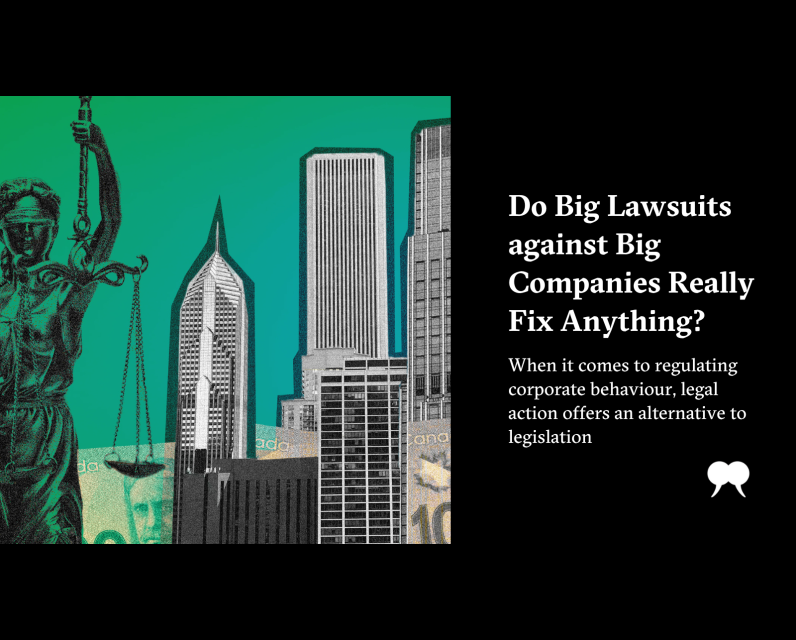Source Feed: Walrus
Author: Leah Borts-Kuperman
Publication Date: May 9, 2025 - 06:30
Do Big Lawsuits against Big Companies Really Fix Anything?
May 9, 2025

Amid inflation, duopolies, and oligopolies, there’s a sense of frustration over what powerful companies with deep pockets might be up to. And it’s not just consumer suspicion. In the past year or so, government agencies in Canada have launched a number of lawsuits against big businesses over potentially shady practices.
Canada’s Competition Bureau is in an ongoing lawsuit against Rogers, alleging false advertising for their phone plans and claiming the company’s “Infinite” plans actually had data speed limits. Last June, the government of British Columbia filed a lawsuit against the manufacturers of “forever chemicals” for the widespread contamination of drinking water with highly persistent human-made substances that can stay in the environment for centuries. Earlier this year, the BC Supreme Court also certified the province’s lawsuit against opioid manufacturers and distributors; it aims to recover the costs of treating opioid-related diseases allegedly caused by the industry.
A dozen major Ontario school boards and two private schools have also taken some of the largest social media companies to court over the youth mental health crisis, claiming that the way their platforms are designed has negatively rewired the way children think, disrupting how schools operate. The school boards, organizing as Schools for Social Media Change, are hoping for damages to the tune of $8 billion from Facebook, Snapchat, Instagram, and TikTok.
These kinds of cases can be so drawn out that it can be difficult to discern whether these legal actions will end in meaningful change that benefits regular citizens. Rogers has been selling the so-called unlimited data plans in question since 2019, and the Competition Bureau, after years of investigation, recently charged and fined Manitoba contractors in a bid-rigging conspiracy that happened more than a decade ago.
Hassan Ahmad teaches corporate accountability at Osgoode Hall Law School and co-authored the forthcoming Cambridge Handbook of Litigating Business and Human Rights Violations: Themes, Perspectives, and Prospects. He says the purpose of these lawsuits is to help Canadian governments recoup their costs for citizens harmed by these companies and not to directly benefit consumers.
“When it’s the BC government suing opioid companies, it’s because of the health care costs that ultimately go back to the province. And similarly, when it comes to the school boards, it’s the cost that they bear for the mental health or the physical and emotional harms that result from excessive social media use,” Ahmad said, in the latter case referring to costs like additional staff, hours, and attention to combat the effects of social media products and their intentionally addictive nature, according to the schools.
The lawsuits, Ahmad says, can also be viewed as a way to regulate massive companies. “The direct option is for governments to legislate the conduct of corporations,” he said. “The courts tend to be an end-around option when the direct option isn’t really possible or hasn’t worked.”
Ahmad explained that legislation may be unlikely due to a powerful corporate lobby, noting that the same governments seeking compensation from these companies also “have a strong relationship” with them—relationships that can hinder the passage of robust laws, sometimes even to the government’s own detriment. Courts tend to be more resistant to these politics. “They remain independent,” Ahmad said, “and therefore are able to push back in a way that legislatures cannot.”
While they may be a last resort, these kinds of big lawsuits against big companies can sometimes work. For example, the Tobacco Master Settlement Agreement was the largest civil litigation settlement in dollars. It was filed in 1998, by forty-six states, DC, and five US territories, against the four largest tobacco companies in America, with the aim of seeking compensation for the cost of tobacco-related illnesses on the health care system, similar to the current lawsuits against opioid manufacturers.
The final settlement in the tobacco case agreement required the companies to pay $206 billion (US) over twenty-five years. In addition to the money, the tobacco companies also agreed to stop certain marketing practices and to fund anti-smoking campaigns, which ultimately benefited regular citizens; youth smoking rates have fallen a whopping 86 percent in the US from 1997 to 2021.
“There have been instances, certainly—and I come back to tobacco companies—where companies have gone bankrupt, or they’ve been significantly hit in their bottom line,” Ahmad said. “I’m not saying it’s impossible, but that’s the exception, not the norm.”
He further explained that such lawsuits are most effective when paired with other tactics. On their own, the lawsuits may not be enough to change corporate behaviour or to significantly impact companies’ bottom lines.
“There has to be a multifaceted approach,” Ahmad said. “You can have lawsuits by the victims themselves, and you could have what’s called shareholder activism, which is the shareholders of the companies themselves pushing back.”
A proposed class-action lawsuit on behalf of consumers was filed in November in a US district court. It claims that four large potato companies, two of which are Canadian, have conspired together to overcharge shoppers for products like frozen french fries and tater tots, effectively running a “potato cartel.”
One example of a shareholder lawsuit in Canada right now is TD’s investors suing the bank for inadequacies in its anti–money laundering controls. These kinds of lawsuits tackle issues like mismanagement, insider trading, and fraud from within and can be particularly effective because they leverage the legal responsibility companies have to their shareholders.
Without these kinds of adjacent actions, the jury is still out on if, how, and when lawsuits from government agencies alone will create meaningful change. Ahmad pointed to other tools regular citizens can use to push back on corporate behaviour they don’t support. Things like protests and ad campaigns remain important, Ahmad said, referring to high-profile social movements like #MeToo, which gained momentum when women shared their experiences under the hashtag on social media.
“I’m not saying these cases are not necessary, but in and of themselves, are they able to make a change for the victims? I’m not completely convinced of that.”
Like regular citizens who formed anti-smoking groups and protested big tobacco with boycotts and darkly funny posters in the 1990s, frustrated consumers will need to take action instead of relying wholly on these cases if they want to hold huge companies accountable.The post Do Big Lawsuits against Big Companies Really Fix Anything? first appeared on The Walrus.
Gov. Gen Mary Simon will oversee the ceremony, which will see new cabinet ministers take the oath of office, a key step for Carney's Liberal government.
May 9, 2025 - 14:00 | Sean Boynton | Global News - Canada
Ottawa police robbery detectives are seeking possible witnesses to a swarming theft April 25 Friday at the Rideau Street O-Train station. Read More
May 9, 2025 - 13:57 | Norman Provencher | Ottawa Citizen
The ongoing trade war between the U.S. and Canada has cooled Canadian housing markets significantly. Anxiety over tariff uncertainty and a looming threat of recession have led to notable shifts in market activity and home prices across the country, according to a recently released
special report on housing from RBC
.
Home resales have dropped sharply, with March 2025 marking the third consecutive monthly decline. Nationally, resales were down an estimated 4...
May 9, 2025 - 13:52 | Stewart Lewis | National Post




Comments
Be the first to comment